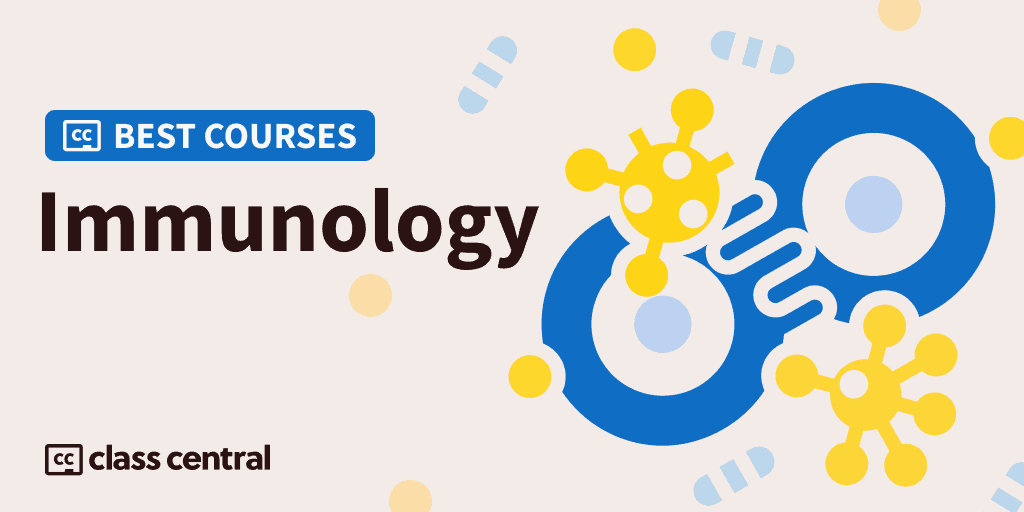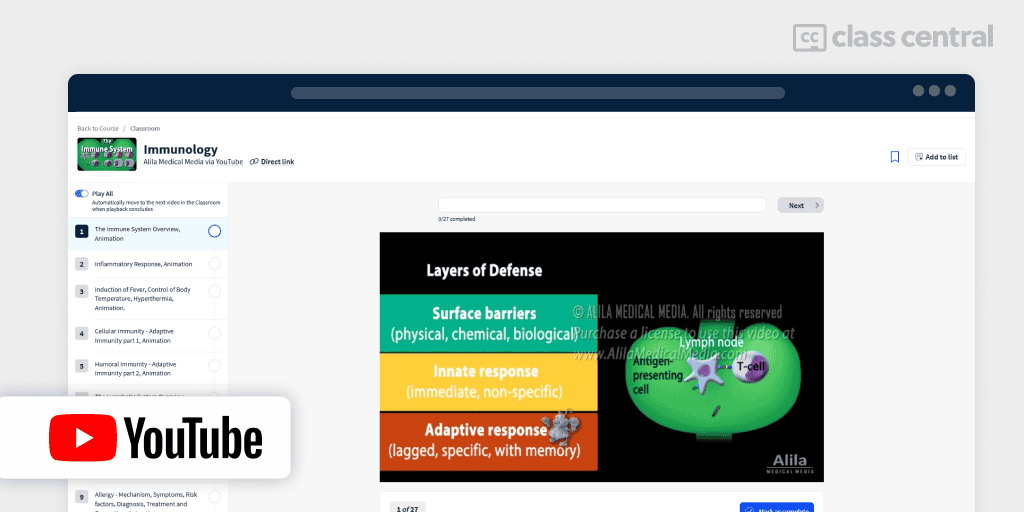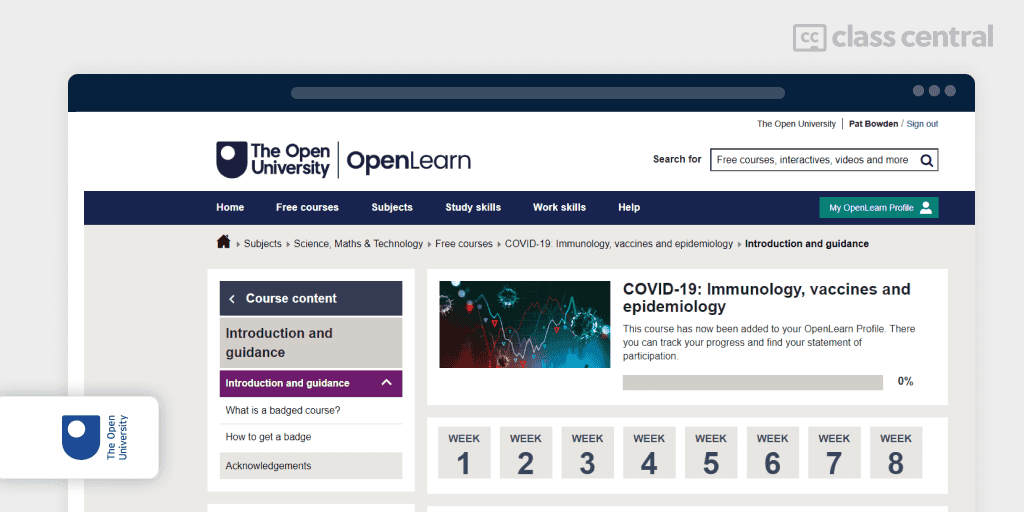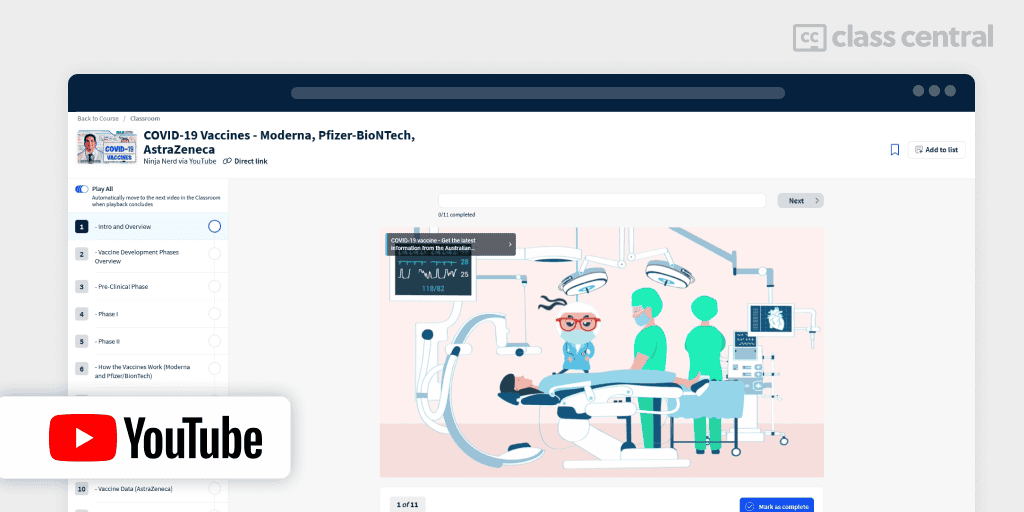8 Best Immunology Courses for Online Learners in 2024
Find the best immunology courses for online learners from esteemed universities and educators. Discover the immune system’s role in a wide range of diseases.

Did you know that there are more bacteria on and in our bodies than actual human cells? We generally don’t notice them because they are small and many are beneficial, but if they make us sick, they can cause a big impact.
Our bodies have several layers of defense against bacteria and viruses. I’ve handpicked the best immunology courses from various providers in the Class Central catalog for this Best Courses Guide (BCG). Learn how we stay well despite the constant bombardment of microbes, and what happens when our defenses break down. Learn about what happens when our defense systems start attacking our own cells in various auto-immune diseases, how allergies develop, and how the immune system protects us against cancerous cells.
Some courses discuss vaccines and you can also learn about the COVID-19 pandemic.
I explored over 100 immunology online courses for this Best Courses Guide. The top eight courses are created by Rice University, Imperial College London, The Open University, and Tel Aviv University among others. I’ve also thrown in a couple of short, easily understood offerings from Alila Medical Media and Professor Dave Explains for good measure.
Click on the shortcuts for more details:
- Top Picks
- What is Immunology?
- Courses Overview
- Why You Should Trust Us
- How We Made Our Picks and Tested Them
Here are our top picks
Click to skip to the course details:
What is Immunology?
The immune system has two major facets: innate immunity that protects us against general threats, and adaptive immunity, in which the body develops immunity to particular agents over time. When adaptive immunity is developed, the immune system will recognize and start fighting infections more quickly on a subsequent exposure. It’s an effective way to keep us healthy. Immune responses to pathogens and cancer cells can promote health, but sometimes the immune system responds to non-pathogens.
As medical advances are made, we are discovering that many diseases (not just infections) are affected by the immune system. Allergies are an immune response to many common molecules in the environment. Autoimmune diseases including multiple sclerosis, juvenile diabetes, rheumatoid arthritis, lupus, and Crohn’s disease occur when the immune system starts fighting the body’s own cells.
Another situation when we may need to suppress the immune system is for transplanted organs, when the body sees the organ as a foreign invader.
If you’re studying immunology, a useful resource is the immunology forum on Reddit.
Courses Overview
- 7 courses are free or free to audit and 1 is paid
- 5 courses offer a certificate of completion, one of these is free
- The Immunology subject is followed by 1.8K learners on Class Central
- The most featured provider is YouTube with 2 courses, followed by Coursera with 2 courses.
Best Beginner Immunology Course (Tel Aviv University)

Viruses & How to Beat Them I: Introduction to Cell Biology & Viruses is designed to demystify the world of viruses and their interaction with human cells.You’ll embark on a journey to understand the fundamental aspects of cell biology and virology and learn how our cells function to maintain health. Through engaging lectures and laboratory demonstrations, you’ll explore the mechanisms of viral replication, the impact of various epidemics, and delve into the body’s defense mechanisms, with a special focus on the recent SARS CoV2 virus and COVID-19. The course content is designed to be accessible to all, ensuring scientific accuracy while explaining complex concepts in understandable terms. Participants will also have the unique opportunity to hear from leading experts and Nobel Prize-winning scientists in the fields of Chemistry and Medicine.
Syllabus overview:
- Introduction to cell biology: understanding the structure and function of cells
- Overview of viruses: what they are made of and how they invade our bodies
- Detailed exploration of viral replication and the body’s defense mechanisms against viruses
- Focus on epidemics caused by viruses, including the flu, AIDS, Ebola, and the recent COVID-19 pandemic
- Laboratory demonstrations on how cells and viruses are grown and studied
- Interviews with leading experts and Nobel Prize-winning scientists in chemistry and medicine.
If you want to learn more, go on to Viruses & How to Beat Them II: Immunology Fundamentals & Applications. This course aims to provide a clearer understanding of how our immune system functions, the concept of immunological memory, and the latest advancements in vaccine technology, particularly the revolutionary mRNA vaccines. By examining the characteristics and impact of coronaviruses on human health, livestock, and pets, learners will gain insights into the challenges and successes in the fight against these pervasive pathogens.
These two courses make up the Viruses & How to Beat Them: From Cells to Pandemics Professional Certificate program. They are an updated version of Viruses & How to Beat Them that was in Class Central’s list of The Best Free Online Courses of All Time.
“Professor Gershoni does an excellent job in explaining a complicated subject (the inner workings of the cell) in a very clear manner, without leaving out details or watering down…Icing on the cake is the interviews with experts (including Nobel laureates!) in the field.” – Bart, Class Central learner. (Review of the original course that has now been broken up into the two current courses.)
| Provider | edX |
| University | Tel Aviv University and Campus – the Israeli National Project for Digital Learning |
| Instructor | Jonathan Gershoni |
| Time Commitment | 14-21 hours |
| Rating | 5.0/5.0 (29) |
| Cost | Free audit |
| Certificate | Paid |
Best Intermediate University-Produced Immunology Course (Rice University)

If you already have some knowledge of biology and cells, the Fundamentals of Immunology Specialization is an excellent way to learn about immunology in depth.
It’s designed to introduce students to the core concepts and terminology of immunology. It aims to provide a foundational understanding of the immune system, its functions, and its role in health and disease, enabling students to grasp and evaluate the latest advancements in immunological therapies.
In the four courses of this Specialization, you’ll learn about:
- Innate Immunity and B-Cell Function: introduction, components and functions of innate immunity, B-cell development and function
- T-Cells and Signaling: T-cell development and differentiation, antigen recognition and response, cell signaling in the immune response
- Death by Friendly Fire: autoimmunity and immune tolerance, mechanisms of immune response regulation, pathogenesis of autoimmune diseases
- Dueling with the Dark Side: immune system evasion by pathogens, vaccination and immune memory, advances in immunotherapy.
“First off, this course is not for the “faint of heart” (i.e., people taking courses casually/in stride) – it can be argued that this offering is close to a college elective-level course. Thus, while a baccalaureate-level grasp of biology or related fields is not required, you should enter this course with the appropriate mindset. Be ready to watch the videos more than twice, read the provided handouts (before or after each relevant video) and, if necessary, digest further references…” – Aedrian Abrilla, Class Central learner.
| Provider | Coursera |
| University | Rice University |
| Instructor | Alma Moon Novotny, Ph.D. |
| Time Commitment | 88 hours |
| Enrollment | 18.4K |
| Rating | 4.8 / 5.0 (1.7K) |
| Cost | Free to audit |
| Certificate | Paid |
Also Great Immunology Course (Imperial College London)

The 5-course Specialization Immunology: The Immune System and its Failures has an easier workload than the previous course but still expects learners to know basic cell biology.
This course delves into the innate and adaptive immune responses, their role in protecting the body, and how their dysregulation can lead to various immune-mediated diseases. The curriculum is structured into five specialized courses, each focusing on different aspects of immunology.
The five courses cover:
- Immunology: Innate Immune System: Components, complement system, programming of innate immunity by the microbiota, antigen processing, natural killer cells
- Immunology: Adaptive Immune System: B cells and T cells, cytotoxic killing, regulatory T cells, lymphocyte recirculation and homing, effect of age on immune system function
- Immunology: Autoimmunity, Allergy, and Transplants: Introduction to autoimmunity, systemic lupus erythematosus (SLE), haematological autoimmune conditions, asthma and allergic reactions, antibody-mediated transplant rejection
- Immunology: Immune System and Infectious Diseases: Immune response to bacteria, viral immunity and evasion, immunity against fungal infections, immune responses to Leishmania parasites, malaria, tuberculosis
- Immunology: Immune Failures and Cancer Immunology: Immunodeficiencies, tertiary lymphoid structures, tumour immunology, viral persistence and human cancer.
“This course was amazing and provides the basic fundamental knowledge of how our first line of immunity defends us from from invaders.” – Aqeel A, Coursera learner review of the first course.
| Provider | Coursera |
| University | Imperial College London |
| Instructor | Malgorzata (Maggie) Trela and Sophie Rutschmann |
| Time Commitment | 30 hours |
| Enrollment | 2.5K |
| Rating | 4.7/5.0 (38) |
| Cost | Free to audit |
| Certificate | Paid |
Best Free Short Immunology Overview (Alila Medical Media)

Immunology covers the anatomy and physiology of the immune system, including the lymphatic system, and delves into innate and adaptive immunity. In a concise 90 minutes of explanations with clear animations, the course explores how the immune system works, disorders, and includes an in-depth look at vaccines.
Syllabus:
- Introduction: overviews of the immune and lymphatic systems
- Innate Immunity: inflammatory Response, induction of fever, control of body temperature, hyperthermia
- Adaptive Immunity: cellular and humoral immunity
- Diseases of the Immune System: 4 types of hypersensitivity, primary Immunodeficiency Disorder (PID), allergy, autoimmune diseases, inflammatory diseases, immunodeficiency
- Vaccines: how they work, herd immunity, vaccine types and how they work
- Miscellaneous Topics: infectious mononucleosis (Mono), gluten-related disorders, psoriasis, eczema
- Pharmacology: histamine and antihistamines.
For more courses, see the Alila Medical Media’s YouTube channel and website.
“Best overview video on immunity ever! Keep up the good work!!” – @adarshaneupane7651, YouTube learner.
| Provider | YouTube |
| Channel | Alila Medical Media |
| Time Commitment | 1-2 hours |
| Views | 54K |
| Cost | Free |
| Certificate | Not available |
Also Great Immunology Course (Professor Dave Explains)
This Immunology course, presented by Dave Farina, offers a comprehensive overview of the immune system and assumes you have some general knowledge of cell biology from his previous courses. It covers how the body responds to pathogens, the process of healing cuts, the causes of allergies and autoimmune disorders, and the workings of vaccines. By the end of this course,you’ll have a thorough understanding of the immune system’s components and functions in a visually stunning way.
You’ll learn about:
- Immune cells, types, and functions
- Structure and immune function of the lymphatic system
- Signal transduction in immune cells: receptor-ligand interactions and types of immune cell receptors
- Cytokines, chemokines, and innate immunity
- Barrier surfaces of the innate immune system
- The complement system: classical, lectin, and alternative pathways, the inflammatory response, pattern recognition receptors and the inflammasome
- Key innate immune cells: macrophages, dendritic cells, neutrophils, mast cells, basophils and eosinophils, natural killer cells, innate lymphoid cells
- Adaptive immunity.
This is an ongoing series, so after you’ve finished, check out the Professor Dave Explains YouTube channel for more videos and playlists.
“Hey, Professor Dave! The way you explain is just amazing!!!!” – @ummaykulsumtania849, YouTube learner.
| Provider | YouTube |
| Channel | Professor Dave Explains |
| Instructor | Dave Farina |
| Time Commitment | 3-4 hours |
| Views | 238.8K |
| Cost | Free |
| Certificate | Not available |
Best Immunology Exam Preparation Course (Study.com)

Immunology: Help & Review is designed to enhance your knowledge of the immune system, covering its elements, how it fights infections and diseases, and its role in the lymphatic system. Through engaging video lessons, this course is ideal for students needing supplementary material, exam preparation, or resources for a project. It offers a comprehensive overview of immunology, from the basics of microbiology to the specifics of immune responses.
While some Study.com courses offer college credit for partner institutions, this course does not, but you can earn a certificate.
The course syllabus includes:
- Understanding the immune system: components and functions, antigens, antibodies & T-Cell receptors, immune responses against tumors & transplants
- Pathogens and the Immune Response: microbiology, viruses, disease origins
- Medical interventions: antibiotics & vaccines
- Adverse immune reactions and hypersensitivity.
Study.com also has an interesting Virology Study Guide (6 hours).
| Provider | Study.com |
| Time Commitment | 11 hours |
| Cost | Paid (with free trial) |
| College credit | No |
| Certificate | Paid |
Best Course About COVID-19 Immunology and Vaccines with Free Certificate (The Open University)

COVID-19: Immunology, vaccines and epidemiology delves into how the immune system fights viral infections, with a focus on COVID-19. It covers the use of antibodies in tracking epidemics, the development of vaccines, and the differentiation between vaccinated individuals and those previously infected. The course includes an interactive ELISA assay activity, reflecting real UK data from August 2021. Accredited by the CPD Standards Office, it offers 24 CPD points upon completion, along with a Statement of Participation for evidence of professional development.
You’ll learn about:
- Viral infections and immune response: how the body recognises a viral infection and how the immune system combats it
- Antibody detection and tracking: ELISA – enzyme linked immunosorbent assay, screening for SARS-CoV2 antibodies, tracking infection
- Epidemiology and vaccines
- Virus variants and immune evasion.
The Open University also offers Vaccination (14 hours).
“I really enjoyed this up-to-date course which was very informative with engaging online investigations. Highly recommended.” – Martin James, OpenLearn learner.
| Provider | OpenLearn |
| Institution | The Open University |
| Instructor | David Male |
| Time Commitment | 24 hours |
| Rating | 4.1/5.0 (9) |
| Cost | Free |
| Certificate | Free |
Also Great Free Short Course About COVID-19 Vaccines (Ninja Nerd)

The Ninja Nerd (Professor Zach Murphy) delves into the development, mechanism, and data of COVID-19 vaccines from Moderna, Pfizer/BioNTech, and AstraZeneca/Oxford in COVID-19 Vaccines. The course covers the vaccine development process, including preclinical phases and phases I-III, under the accelerated timeline of Operation Warp Speed. It explains how these vaccines work to stimulate the immune system, producing antibodies and memory cells to protect against SARS-CoV-2. The lecture also presents data on vaccine efficacy, storage requirements, and production capabilities, emphasizing the role of memory T and B cells in providing immunity.
This course has amassed an impressive 6.8 million views since being released 3 years ago.
Syllabus:
- Intro and overview
- Vaccine development process: overview, pre-clinical phase, phase I, phase II
- Mechanism of vaccines: how they work
- Vaccine data
- Conclusion
For more topics, see the YouTube channel and Ninja Nerd website.
“Do the world a favor, venture into academic medicine, become a medical professor. Your lectures would be absolutely brilliant.” – @user-ym9en6pv9f, YouTube learner.
| Provider | YouTube |
| Channel | Ninja Nerd |
| Instructor | Zach Murphy |
| Time Commitment | 44 mins |
| Views | 6.8M |
| Likes | 46K |
| Cost | Free |
| Certificate | Not available |
Why You Should Trust Us
Class Central, a Tripadvisor for online education, has helped 60 million learners find their next course. We’ve been combing through online education for more than a decade to aggregate a catalog of 200,000 online courses and 200,000 reviews written by our users. And we’re online learners ourselves: combined, the Class Central team has completed over 400 online courses, including online degrees. I’ve personally completed over 200 online courses in a variety of topics.
How We Made Our Picks and Tested Them
Trying to find “the best” can be daunting, even for those of us who live and breathe online courses. Here’s how I approached this task.
First, I combed through Class Central’s Catalog and the internet to find a variety of free and paid open courses, some with certificates. You don’t need to enroll in a university to learn about immunology.
When choosing courses, I considered the following factors:
- Renowned Institutions: I looked for recognized institutions
- Instructor experience: I sought instructors with extensive experience and engaging styles
- Popularity: I checked numbers of enrollments and views to find popular courses
- Course content: I examined courses that covered a range of topics and presentation styles, including the basics and more advanced topics. I watched some course videos to sample courses I hadn’t already taken
- Learner reviews: I read learner reviews (when available) to get a sense of the quality of each course, leveraging the Class Central database with its thousands of course ratings and reviews written by our users as well as available course provider reviews.
Then, I defined the scope for these recommendations. An immunology course can cover various topics, so I chose top courses from various sub-fields.
Ultimately, I used a combination of data and my own judgment to make these picks. I’m confident these recommendations will be a reliable way to learn about immunology.









